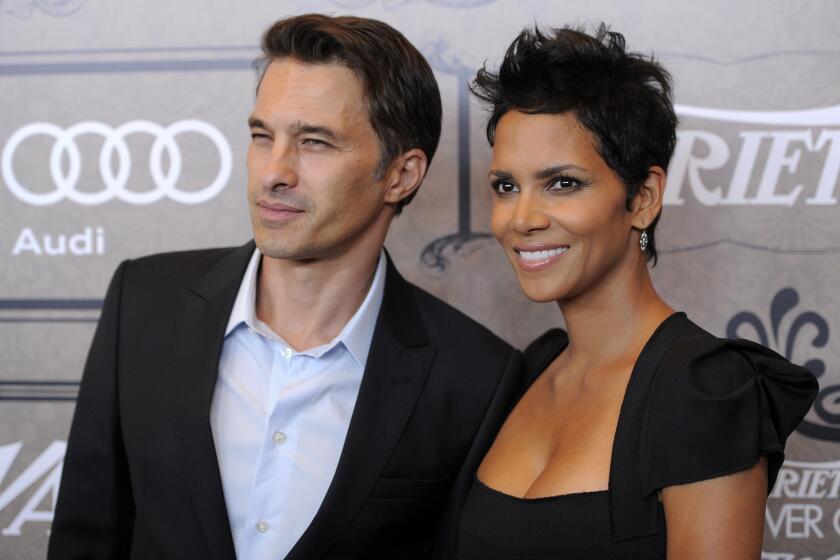MOVIE REVIEW : ‘Doc Hollywood’: Southern Exposure
In “Doc Hollywood,” Michael J. Fox plays Ben Stone, a hotshot Washington, D.C., plastic-surgery resident who piles into his ’56 Porsche Speedster and heads for the nip-and-tuck heaven of Beverly Hills.
The movie (citywide) is about how he is detained unexpectedly in the small town of Grady, S.C., a hick byway in urgent need of a young, new doctor. We’re supposed to discover, along with Ben, the countrified charms of the simple life, which includes his reading letters to illiterate patients and walking pet pigs. Will Ben decide to stay in Grady or will he follow his wallet to Hollywood?
If you have any doubt as to the outcome, you haven’t been paying attention to the latest self-serving movie trend. The back-to-basics, anti-greed message of “Doc Hollywood” has been all over the screens this season, from TV’s “Northern Exposure” to the movies’ “City Slickers,” “Regarding Henry,” “Life Stinks” and “The Doctor.”
In “Doc Hollywood,” the “basics,” as represented by Grady, is really the same old movieland hicksville. The Scots director Michael Caton-Jones and his screenwriters, Jeffrey Price, Peter Seaman and Daniel Pyne, give us the kind of small town that could only exist in the perfervid imaginations of filmmakers who have never stepped inside one, at least with their eyes open. If Ben is uncertain whether to move on to Hollywood, the filmmakers have clearly never left it.
This is a movie for all those who believe, or want to believe, that people who choose to live in America’s rural byways are a rollicky and simon-pure clan of good-natured doofuses and folksy eccentrics.
When an old lady complains to Ben that she can’t see properly and he solves the problem by taking her glasses and clearing away a smudge, we seem to have entered the Land of the Stunted. Scenes like these go beyond condescension--they’re flabbergasting. The whole sunny production is like Frank Capra with a lobotomy.
Grady, which bills itself as the Squash Capital of the South, is supposed to be an idealization of the finer things in life--in other words, everything that Beverly Hills isn’t. Everyone lives together in higgledy-piggledy harmony: blacks and whites, young and old, rich and poor. Next to it, the Mayberry of “The Andy Griffith Show” is austere. (The movie is closer to “Green Acres,” though that show seems almost Shavian by comparison.)
But the fantasy has no texture. Capra, whose “It’s a Wonderful Life” shows up in a millisecond clip, at least leavened his corn with sharp small-town observation. Preston Sturges, another of the film’s models, gave his country types such roisterous, ornery life that it would never occur to us to call them hicks.
“Doc Hollywood” (rated PG-13 for brief nudity) draws its energy almost exclusively from cliche. Caton-Jones, perhaps because he’s Scottish, feels free to indulge himself with every piece of small-town, movie-derived Americana he can train his camera on; he’s an equal-opportunity borrower. Even “Local Hero,” directed by fellow Scotsman Bill Forsyth, gets pillaged.
The cornball rowdiness is partially redeemed by the good cast, which includes Woody Harrelson as a lunky insurance salesman, David Ogden Stiers as the mayor, Roberts Blossom as a judge, Barnard Hughes as the town’s decrepit doctor and Frances Sternhagen as a local busybody. Bridget Fonda turns up as a Hollywood-struck belle and, as usual, she’s much stronger than her role allows for. Fonda has the power and the sass to become a major actress. Why did she bother with this dinky cameo?
Michael J. Fox, as in “The Secret of My Success” and the “Back to the Future” films, goes in for a lot of scampering here. In between scampering, he mugs. It’s probably just as well that Fox doesn’t bring much gravity to the role; if he were any moonier and heartfelt, the film might really be exposed as a crock.
It is anyway, since Ben is saddled with a love interest who does the heartfelt bit for the both of them.
Julie Warner’s Lou, Ben’s ambulance driver and a would-be lawyer, makes her first appearance striding out a lake buck naked. She’s wise to Ben’s slick city ways but she falls for him anyway; she recognizes the simplicity of his soul.
By the end, her dialogue appears to have been ghost-written by the late Maxwell Anderson or Cyrano de Bergerac; she compares Ben to a “bright shooting star” and it’s music to his ears. Now if only Ben had decided to leave Grady to become a screenwriter instead of a doctor.
In Hollywood, he could hear that kind of dialogue all the time.
‘Doc Hollywood’
Michael J. Fox: Ben Stone
Julie Warner: Lou
Barnard Hughes: Dr. Hogue
A Warner Bros. presentation. Director Michael Caton-Jones. Producers Susan Solt and Deborah Johnson. Executive producer Marc Merson. Screenplay Jeffrey Price and Peter S. Seaman and Daniel Pyne. Cinematographer Michael Chapman. Editor Priscilla Nedd-Friendly. Art directors Eva Ana Bohn and Dale Allen Pelton. Set decorator Cloudia Rebar. Running time: 1 hour, 54 minutes.
MPAA-rated PG-13 (brief nudity).
More to Read
Only good movies
Get the Indie Focus newsletter, Mark Olsen's weekly guide to the world of cinema.
You may occasionally receive promotional content from the Los Angeles Times.










